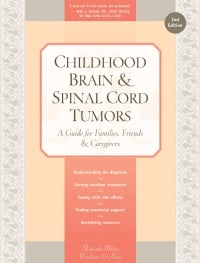Childhood Brain and Spinal Cord Tumors
Finding a neurosurgeon and neuro-oncologist
Sometimes parents do not have the luxury of time in choosing a pediatric neurosurgeon or pediatric neuro-oncologist. Your child may have life-threatening symptoms that require emergency surgery. Or your child might be assigned to the attending or fellow who happens to be on call at the time of diagnosis. However, if it is not an emergency, you probably will have time to check the qualifications of both the doctors and the medical facility where you child was first diagnosed.
A medical oncologist sees patients with a wide variety of cancers and blood diseases. It will necessarily have taken him much longer to accumulate respectable clinical experience with brain tumors than would a neuro-oncologist, who sees brain tumor patients exclusively and on a daily basis. What a neuro-oncologist would learn in a single year of practice might take a medical oncologist a decade to grasp. When a situation arises, you want the doctor who calls to mind a hundred similar cases he has seen recently, not the doctor who will rack his brain trying to remember the dozen cases he may have seen or merely read about long ago.
A neuro-oncologist, because of his understanding of the entire brain tumor experience (not just the chemo part), can address questions related to cognitive changes, family tensions, etc., and will have a better handle on interactions among drugs the brain tumor patient is likely to be taking simultaneously. He is also more likely to have the tact and sensitivity needed to deal with the very specific needs of the brain tumor patient and family. The difference between our oncologist and neurooncologist was amazing. We considered the original guy fine (and he was), but then someone came in and turned on the light. It was like that moment when Dorothy from The Wizard of Oz steps out of the house and the world’s in color.
During treatment, your child will see a myriad of doctors. It is essential that you and your child are comfortable with your child’s pediatric neurosurgeon and neurooncologist and that your family feels the doctors are competent, caring, and easy to communicate with. When choosing your child’s pediatric neurosurgeon and/or neurooncologist, here are several traits to look for:
- Board certified in the field
- Establishes good rapport with your child
- Communicates clearly and compassionately
- Skillful in performing procedures
- Uses the latest surgical tools and techniques
- Answers all questions
- Consults with other doctors on complex problems
- Uses language that is easy to understand
- Makes the results of all tests available
- Acknowledges your right as parents to make decisions
- Respects your values
- Able to deliver the truth with hope
If you don’t develop a good rapport with your child’s doctor(s), ask to be assigned to a different doctor whom you have met on rounds or during clinic visits. Most parents are accommodated, because hospitals realize the importance of good communication and rapport between families and doctors. You will, however, still see different doctors, because many institutions have rotating doctors on call.
The neurosurgeon told us that everything looked great on Janet’s MRI and to come back and see him in 3 months. He also gave me $10.00 and said if we get down to Biloxi again to play #22 on roulette for him. I asked, “Why 22?” and he said that was the date that he met an individual that helped change his perspective on life, which in turn has allowed him to treat his patients better. He then handed me Janet’s chart and pointed to our first appointment date: Sept. 22, 2000.
For 2 months, we were dealing with a doctor who said there was only a “vanishingly small” chance at a cure—NO clinical trials, NO other options, NO, NO, NO. I did my own research, and ended up with a doctor new to our hospital, who gives Danny a “real chance.” Not only does his attitude make a difference to my own attitude (it’s actually pleasant to be in the same room and talk to him), but I believe he is actively searching out treatment options and in fact has a whole list of things to try. The first doctor came at it from a much more conservative vantage point—if something didn’t have a tried and true track record he wouldn’t recommend it. The problem in our case was that Danny has an incredibly rare brain tumor so there is no track record. One final note: every doctor I spoke with, except, of course, our first one, said that there are always exceptions. They’ve seen patients 10 years ago who they said would never make it, and they’re doing great. I need a doctor who helps me keep my head attuned to the positive.
Table of Contents
All Guides- Introduction
- 1. Diagnosis
- 2. The Brain and Spinal Cord
- 3. Types of Tumors
- 4. Telling Your Child and Others
- 5. Choosing a Treatment
- 6. Coping with Procedures
- 7. Forming a Partnership with the Treatment Team
- 8. Hospitalization
- 9. Venous Catheters
- 10. Surgery
- 11. Chemotherapy
- 12. Common Side Effects of Chemotherapy
- 13. Radiation Therapy
- 14. Peripheral Blood Stem Cell Transplantation
- 15. Siblings
- 16. Family and Friends
- 17. Communication and Behavior
- 18. School
- 19. Sources of Support
- 20. Nutrition
- 21. Medical and Financial Record-keeping
- 22. End of Treatment and Beyond
- 23. Recurrence
- 24. Death and Bereavement
- 25. Looking Forward
- Appendix A. Blood Tests and What They Mean
- Appendix C. Books and Websites

